A protest by French dairy farmers angry at how much they are being paid for their milk has ended – for now at least - after the giant dairy firm Lactalis agreed to raise its prices. The company, the largest dairy products group in the world, says it will pay farmers an average of 290 euros per tonne of milk between now and the end of the year, in contrast with the 256.90 euros a tonne it paid in July.
Yet the plight of many dairy farmers in France remains precarious, as Mediapart discovered when it went to meet protesters outside the firm's headquarters at Laval in western France a few days before the dispute was settled. Here at a roundabout outside the group's buildings, several hundred people came to protest despite the heatwave, weather conditions that did not, incidentally, augur well for the farmers' late fodder crops.
“Small farmers no longer even have the energy to get angry, they're in despair,” explains Alain, who had come from near Martigné-sur-Mayenne, to the north-east of Laval, to demonstrate. “We're very proud people, we keep our poverty to ourselves. Just a fortnight ago a guy in the département [editor's note, similar to a county] killed himself. At this rate within 20 years France will be buying its food from abroad.”
Alain and his wife Sylvie own 60 cows and a farm that one of their three sons wants to take over when they retire. It it is difficult, though, to make plans for the future in the current economic climate. “We send our milk to the company Vaubernier, like 200 other farmers in the region,” says Alain. “In the first six months of the year they bought our milk at an average of 276 euros a tonne, barely more than Lactalis who paid on average 266 euros. Depending on the farm, for a farmer to earn the equivalent of the minimum wage they'd need to be paid between 340 and 380 euros [a tonne]. So we've been working at a loss for a year. In these circumstances how can you encourage someone to set up [as a farmer]?” he wonders.
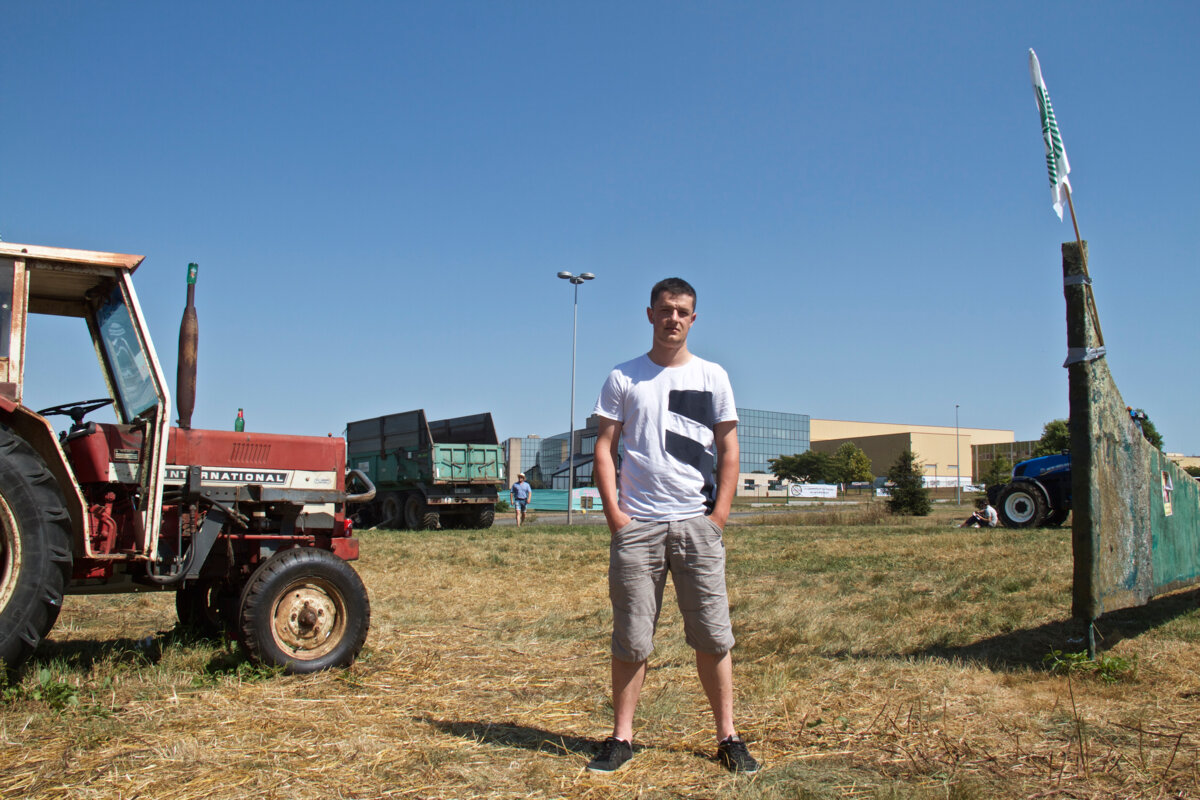
Enlargement : Illustration 1

Among the protesters were men donning the obligatory farmers' union cap, women and some children accompanying their parents, plus many young people worried about a future in which only the most optimistic hope to prosper. “I carry out artificial inseminations on all the farms in the north of [the département of] Mayenne and I have still not seen any young person taking over a farm this year,” says Adrien, 21, who went to agricultural college and has a management qualification. “In time of course I'd like to have my own farm, like my parents. That's why I've come here to call for a price rise. For my family, for my future and for all of the professionals who depend on small farmers for their livelihoods, such as vets, hauliers, accountants, farm equipment sellers and so on. Behind each farmer there are six or seven people working”
Between 2000 and 2010, 37% of dairy farms in France disappeared, while in the same period the size of herds grew by 40%. This move towards a concentration of herds and bigger farms is expected to accelerate in the coming years. For in the wake of the demise of milk quotas, which were ended by the European Union on April 1st, 2015, the whole farming map of Europe is in the process of being redrawn. The immediate consequence has been a rise in European milk production in a market that is shrinking because of the Russian embargo on food products, a ban put in place on August 7th, 2014, in retaliation for European sanctions that followed the Russian invasion of Crimea.
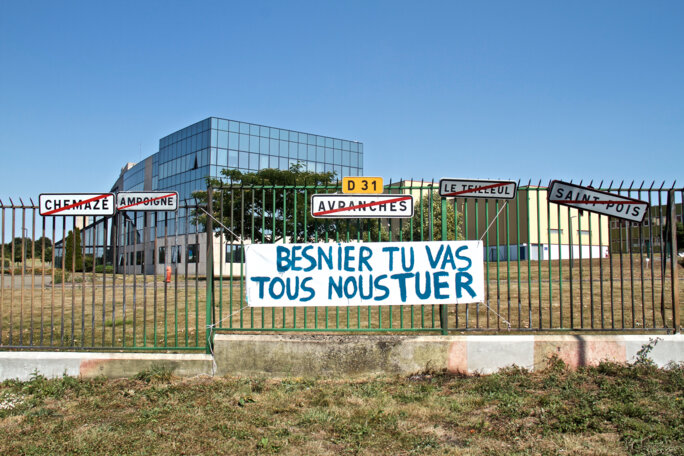
Enlargement : Illustration 2

“North European countries have been the most affected by the closure of the Russian frontier, so their milk has come and flooded the market and driven down prices. At the same time Chinese imports have slowed down,” says Benoît Faucon, vice-president of the Chamber of Agriculture in the Mayenne. “Germany, Ireland and Poland have also been waiting for years for the end of European restrictions to increase their production. The problem is that in those states the environmental standards are significantly less strict than in France, which automatically lowers the price of their milk, which is a lot more competitive than that produced here in France.”
So, having for a long time been in favour of liberalising the market in milk, having campaigned for years for an increase in national production, and after having declared itself ready to get involved in a global price war, the main farming union the FNSEA is now being forced to back-pedal. “Those who are calling for demonstrations are the ones who were advocating the end of quotas and all-out production. That policy has made us lose the farming good sense where production is carried out with animals going out to pasture,” Dominique Morin, secretary general of the Confédération Paysanne, which represents many smaller farmers, told the local paper the Courrier de la Mayenne. “That's possible with a herd of 50 cows but not with 200.”
'Our milk price varies according to the wishes of the processor'
“Small farmers are the only ones who don't have control over the sale price of their products,” explain Gérard and Maryline at their farm near the village of Moulay in the Mayenne département. “Only a few year ago the rates were fixed by the dairy inter-professional group which brought together producers, processors and distributors, but this system was dismantled by the General Directorate for Competition Policy, Consumer Affairs and Fraud Control (DGCCRF) [editor's note, the competition authority] in 2009.”
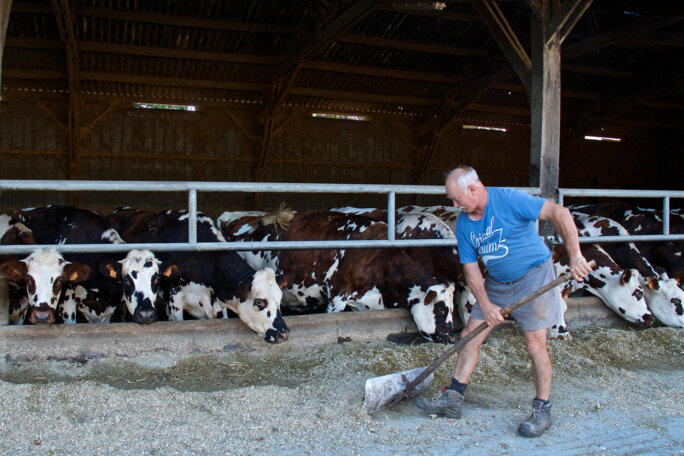
Enlargement : Illustration 3

“Since 2011 we've had to sign five-year contracts with the dairies,” Gérard continues. “The volumes to be delivered are fixed in advance but the purchase price for our milk varies according to the wishes of the processor. If we protest, they tell us to go elsewhere, even though the market is already saturated. We no longer have a way of making ourselves heard.” Milk prices in France are largely indexed to world market rates, according to the calculations made by industrial groups, even if most domestically-produced milk is processed and given added value on French soil.
Gérard and Maryline are close to retirement. After a few more years of belt-tightening their farm will be saved and can, perhaps, be passed to their son. But poverty is creeping through the French countryside. “Even those who work well, even those who are not too in debt from buying equipment are not managing to make ends meet,” sighs Maryline. “Before, women spoke about things after Mass, now we discuss prices in front of the supermarket. And when I listen to my friends, it makes me afraid, the [far-right] Front National is on everyone's lips.” When the couple set up in business in 1981 there were 28 farms in the commune of Moulay. Today there are just three.
“For years everyone has urged small farmers to produce more, to expand, to have bigger herds, even though the profitability per litre didn't increase. It's the vicious circle in which the world of agriculture is trapped,” says the Confédération Paysanne's Dominique Morin. “To have more cows you have to invest in equipment and you go into debt. All that has a cost. And if prices collapse, as has been the case for the last year, it's difficult to keep up with the money owed and to provide a living for your family.” Morin himself milks 50 cows on 50 hectares – about 123 acres – located around his farm, which allows him to graze his cattle outside in the fields for eight months a year and lower his production costs. As far as he is concerned, the French dairy industry can only survive if it “produces better”, according to the markets that pay.
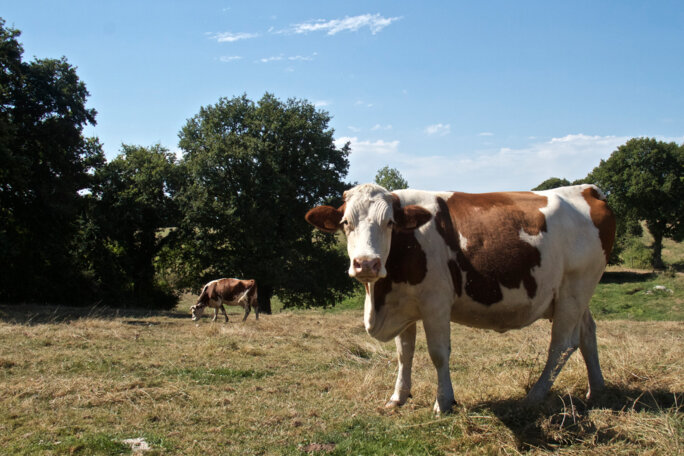
Enlargement : Illustration 4

The grim prospects for the dairy industry have not discouraged 36-year-old Laurent Bigot from starting his own venture. For many years Bigot taught in an agricultural college before, three years ago, buying a farm at Sacé, a few kilometres from Laval. Virtually single-handedly he restored the outbuildings that were threatening to fall down, put down concrete flooring and dug paths for the animals to get to the fields. “Milk is a luxury product, that should never be forgotten,” Bigot remarks, as he heads back into the milking parlour. “I've got 42 dairy cows and 56 hectares [138 acres] of land to feed them. I've made the choice to produce little, often less than the volume that I can send. By letting the animals feed on what's growing in my fields I don't need to buy a lot in from outside.”
On April 5th, 2016, Laurent Bigot began the process of converting to organic farming. So at the end of the 18 months obligatory transition period in January 2018 the farm's finances should start to improve. “I'm not particularly attached to the organic label but my production methods were already relatively close to the required specifications, so naturally I made the leap, especially as demand should continue to increase in the coming years,” he says.
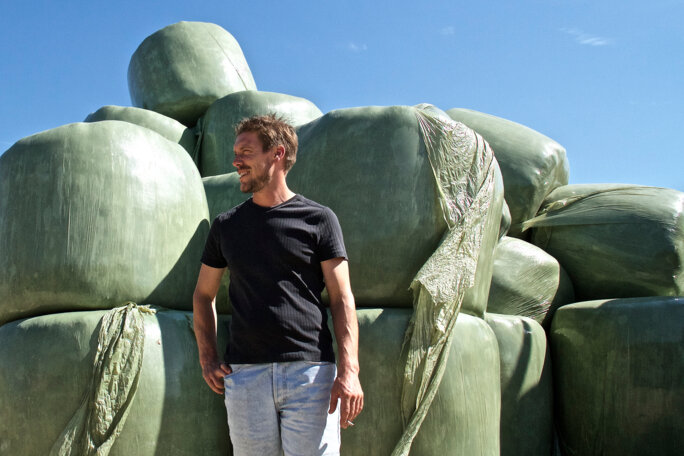
Enlargement : Illustration 5

None of the farmers in the département are under the illusion that the agricultural crisis gripping France can be resolved simply by developing the organic sector. But for the time being this approach offers those who go into it a decent income. According to the dairy industry body the Centre National Interprofessionnel de l’Économie Laitière (CNIEL), organic milk was selling at 437 euros per thousand litres – a thousand litres of milk is roughly equivalent to one tonne – last February, 447 euros in March and 382 euros in April. Some 561 million litres of organic milk were collected in France in 2015 and this figure is expected to rise in 2016.
--------------------------------------------------------------------------------
- The French version of this article can be found here.
English version by Michael Streeter


